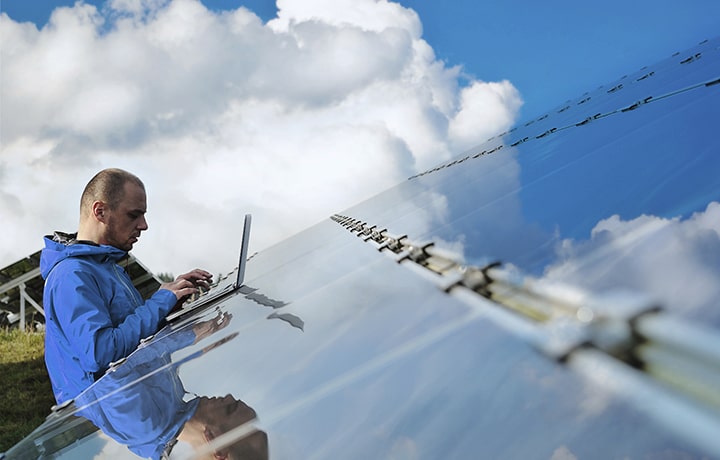
The choices we make today impact the world of tomorrow. That is why we think it is important that we take our responsibility in this. We do this by taking people, the environment and society into account in all our activities. In this way, we add value as a company in the long term. On this page you will find information about our sustainable initiatives.
Taking climate action at NN
Climate change is an urgent and global problem. It is not only about the climate. It is, among others about people, the living environment, food supply, and health. Climate change impacts all. The theme of sustainability and climate has been high on our agenda for years and is anchored in our strategy with concrete objectives.
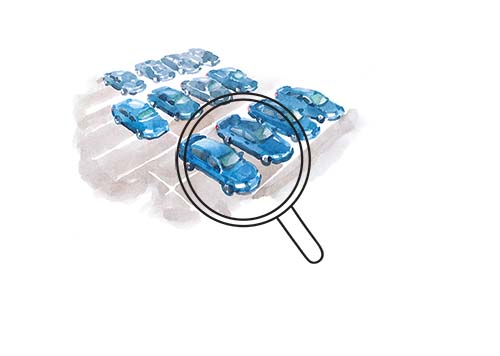
Hello Mobility
Hello Mobility gives you a clear view of your entire fleet. Through data-driven coaching and process improvements, we help you reduce damage and cut costs, all the while making your fleet sustainable. Your drivers will receive tips for improvement via an app.
Damage prevention is a continuous process, not a one-off solution. The Hello Mobility Dashboard provides clear data with predictive value. Hello Mobility gives you enhanced reporting on driving behaviour and details about damage, complaints and fines. You're guaranteed to save on your cost of damage claims, fuel and energy costs, while cutting your fleet's CO2 emissions and spending less on insurance premiums.
Read more about Hello Mobility at:
Hello Mobility - Data-driven damage prevention | Clear view of driving behaviour
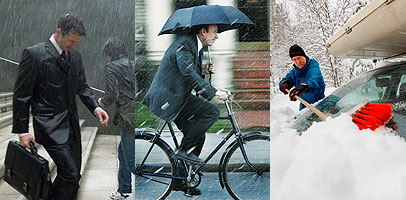
Bad weather on the way? Limit your damage
Because of climate change, the Netherlands is experiencing longer dry spells and is hit more often by heavy rain. Rain and thunderstorms can cause flooding and damage. Several simple measures can prevent many problems here too.
Our prevention pages are a source of simple tips on how to protect your home or business from damage caused by extreme weather. They also include tips on how to prevent fire and damage to solar panels.
Every day, our risk experts (@NNrisicodesk) tweet prevention tips, news reports or examples of situations that they encounter in practice. You can find us via www.twitter.com/NNrisicodesk.

Perfect Day
Always protected against cybercrime, ransomware, phishing and data breaches. Perfect Day, part of Nationale-Nederlanden, is your reliable partner in cybersecurity. Every day, the cyber experts at Perfect Day help lots of businesses safeguard the basic security of their operations.
Cybersecurity in a business starts at the basis: insight into the risks and vulnerabilities of your organisation. Which is why Perfect Day always starts with its Cyber Scan: one of its cyber experts will visit your company, and you’ll receive the findings in a clearly laid-out report so that you know what you need to work on and why. We'd be happy to resolve the points for improvement for you, preferably with your own IT provider. That's usually quick and efficient.
For more information about Perfect Day
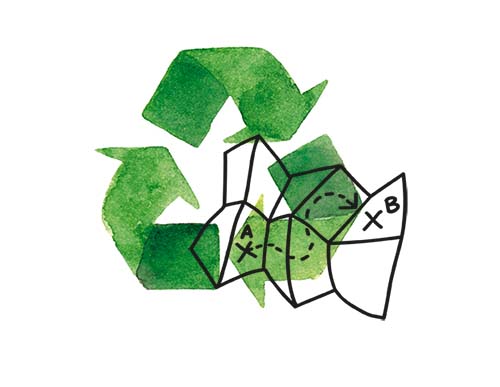
Klimaatplein
Nationale-Nederlanden is a partner of Klimaatplein.com, a platform for CO2-neutral enterprise. It provides information and inspiration, while mobilising companies and institutions to reduce their CO2 footprint. Such as by enabling them to see their own fossil fuel consumption – and showing how easy it is to save energy and to generate green power. Various online tools are offered, and Klimaatplein's news blog is full of real-life cases and inspiring visions.
By now, Klimaatplein has been consulted 1.5 million times by companies and institutions seeking to be more energy-conscious in how they do business. Of these visitors, 45,000 were referred to partners who can provide more help with saving energy, reducing CO2 and generating green energy. Klimaatplein reaches more than 7,500 organisations via Twitter, Facebook and LinkedIn, and its newsletter has some 1,100 subscribers.
As one of its partners, Nationale-Nederlanden provides prevention tips on the platform to inform companies about safe ways to make their business sustainable.
Klimaatroute pilot project
The climate is changing. Are your corporate customers keeping pace? Together with our partner Klimaatroute we’ve started a pilot to help corporate customers look after what's really important to them: their business.
Energy label C mandatory in 2023
In 2023, every office exceeding 100 m2 must have at least energy label C. Energy label C means that an office may use a maximum of 225 kWh in fossil fuels per m2 on a yearly basis. Many office buildings are currently above this limit. These are often buildings that were constructed before 2000.
Klimaatroute Quickscan
Where to start? Klimaatroute can give you a helping hand. They've been helping businesses on the way to a more energy-efficient and sustainable working environment for more than ten years now. They view the office buildings, perform a quick scan to advise on the ways to save and assist businesses in the transition to a more sustainable office. That includes helping them apply for subsidies.
For more information about this pilot project, please contact Nienke ten Hagen.

Sustainable network for repairing damage
Nationale-Nederlanden has set up its own sustainable repair network and, in that context, has joined the Dutch Board for Experts in Property of the Sustainability foundation with immediate effect. We want to make damage restitution more sustainable in the coming years by, for example, repairing – where possible – instead of replacing. We also ask our repair companies in the NN repair network to carry out repairs in a way which can be demonstrated to be sustainable. They can do this by obtaining certificates issued by the Sustainability foundation.
NN to set up sustainable repair network for damage to household contents and premises (amweb.nl)
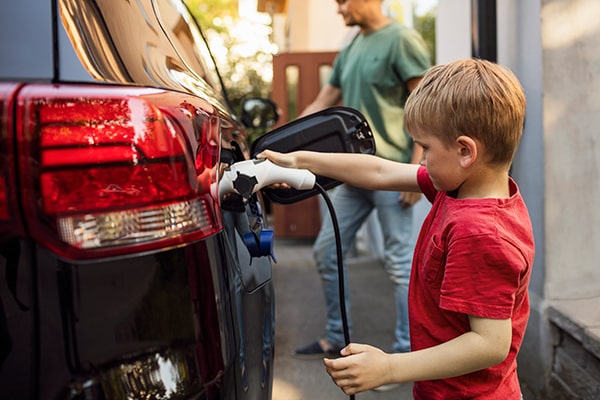
Electrifleet
Electrifleet is an expert and advisor for electric commercial vehicles. We help you calculate, guide and, where possible, save money. We do this with a team of specialists and a large number of partners involved. Together we help you electrify your commercial vehicles.
Electric, hydrogen and hybrid vehicles
We have incorporated non-fossil fuels into our car insurance policies so we can now insure your electric, hydrogen and hybrid vehicles. We can offer insurance to clients who own vehicles such as a Hyundai Nexo FCEV (hydrogen), an Opel Ampera (fully electric) or a Mitsubishi Outlander MPVE (hybrid). We offer these clients our regular terms and conditions and impose no further conditions as we do on ordinary types of fuel like Euro95 and petrol. The acceptance conditions will be extended this year so that we can also insure Teslas.
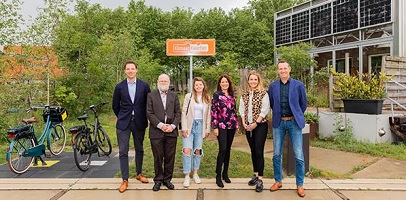
Partnership with The Green Village
Our customers and advisors need proven innovative product developments to be able to take steps towards the future. This need for innovation has led to a partnership between Nationale-Nederlanden (NN) and The Green Village (TU Delft), a testing ground for sustainable innovation in the built environment. Research into innovative solutions for a sustainable residential area leads to feasible and affordable sustainability solutions for our customers and stakeholders of The Green Village.
In the partnership, The Green Village shares the living lab, knowledge, data and an innovative network. It benefits if system innovations, sustainable renovation, new energy sources and the adjustments to the expected climate are elaborated and tested in the living lab. Which risks are insurable, how can sustainable solutions be financed and what adjustments this leads to in a built environment. We bring, among other things, knowledge in healthy and sustainable living and on the insurability of sustainable innovations. The aim is to initiate joint propositions that deliver feasible and, above all, affordable sustainability solutions so that all Dutch people can take steps towards sustainability.
Insurance for recycling companies in the Netherlands
In the Netherlands, we have around 2,000 companies involved in dismantling, demolition and recycling of waste. These companies are often exposed to a high risk of fire and, moreover, there is often limited awareness of prevention, which causes more loss events for this type of industry. This results in lack of insurance offerings for these companies. Yet, from a sustainability perspective, recycling is essential. That is why our Non-life business conducted a pilot with 65 recycling companies in The Netherlands to investigate how this sector can be better insured in 2022.Risk experts have looked at the recycling industry and mapped out what the market looks like, which companies are and which are not insurable (on the basis of certain premiums and conditions). We have assessed what kind of materials recyclers worked with, such as furniture, electronics, batteries or sand and also assessed the type of recycling activities they performed.
NN colleagues also performed onsite visits to participating companies to investigate the need to impose certain measures or conditionalities for insurance. As a result, we now insure recycling companies, whose activities focus solely on collecting, storing, sorting and processing waste. We offer a range of insurances with similar conditions as we offer other companies
Prevent fire with data from smart sensors
With the smart sensors pilot, NN is investigating whether fires with an electrical cause can be prevented by using data from sensors. It would be a great added value for sectors with a high risk of fire, such as the hospitality and agricultural sector. Preventing a barn fire means preventing a lot of suffering for entrepreneurs and animals.
Data detects deviations
The sensors measure different data, after processing the data deviations emerge. Deviations, e.g. in energy consumption, may indicate an increased fire risk. With these insights, an entrepreneur can prevent a fire and reduce his energy consumption.
For more information about this pilot project, please contact Karan Shah.
Damage caused by solar panel particles
From now on, we insure damage caused by solar panel particles free of charge on the environmental damage insurance. Solar panel particles sometimes end up miles away in a fire. This may cause damage to, for example, livestock or crops. Damage caused by solar panel particles should not be a reason not to install solar panels. We support the transition from fossil to renewable energy.
Flood cover for non-primary flood defences
Since 1 October 2021, the property, inventory, and goods insurances have been extended to include flood cover for non-primary flood defences. Flooding is in many cases the result of climate change. By flooding we mean a flood of water from rivers, lakes, canals or ditches due to the unforeseen collapse, damage, overflowing or failure of dikes, quays, locks or other non-primary flood defences. It does not matter whether the flood is the cause or the result of an event that is insured.
Escalation process in case of high ESG risks
Nationale-Nederlanden Schade follows NN Group’s risk governance based on the ‘three lines of defence’ concept, which outlines the decision-making, execution and oversight responsibilities for Nationale-Nederlanden Schade’s risk management. Nationale-Nederlanden Schade’s risk policy framework ensures that all risks are managed consistently and that NN Group as a whole operates within set risk appetite and related risk limits and tolerances.
The Nationale-Nederlanden Schade CRO steers an independent risk organisation which supports the first line in their decision-making, with sufficient countervailing power to prevent excessive risk taking. The Nationale-Nederlanden Schade CRO must ensure that both the Management Board and the Supervisory Board are at all times informed of and understand the material risks to which Nationale-Nederlanden Schade is exposed. The teams within the Nationale-Nederlanden Schade CRO department are multi-disciplinary, focused on the segment and work together across Nationale-Nederlanden Schade on strategic risk, operational risk, financial risk, product risk and business risk.
Climate Risks are assessed as high risk in High Level Risk Assessment that takes place every year. These climate risks are being monitored via the ECF report, which is part of the annual report. One of the measures that are being taken for the key risk sustainability, climate change, social corporate responsibility is to offer a solution for non-insurable risks (for risk technical reasons) at case level. Only when it comes to solutions to sustainability problems. These cases are being monitored by a Risk Committee, Schade Intermediary.
More information about Risk Governance of non-profit insurance risks can be found in the Annual Report NN Schade 2022 (pages 57-65).